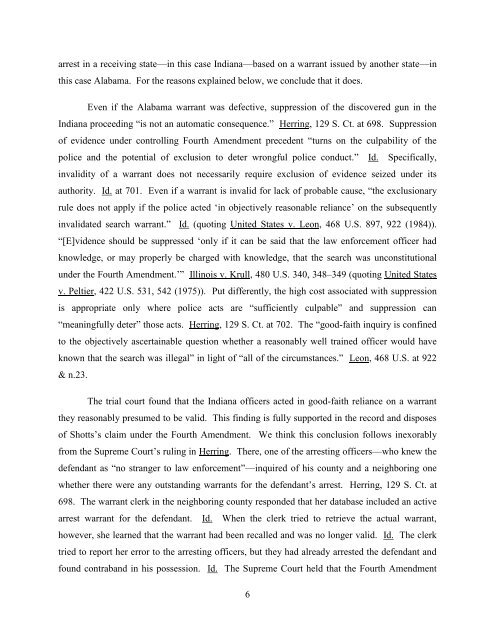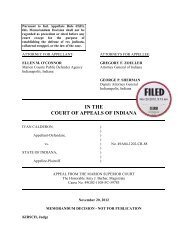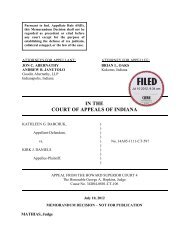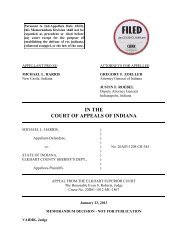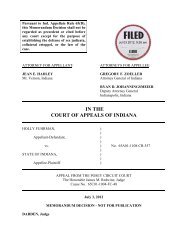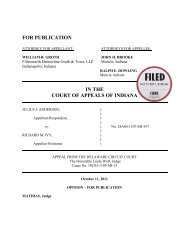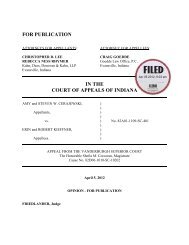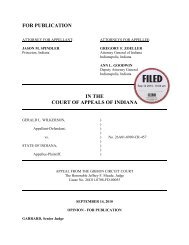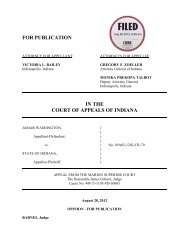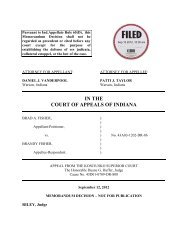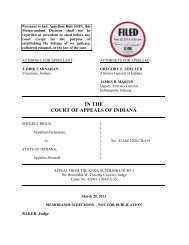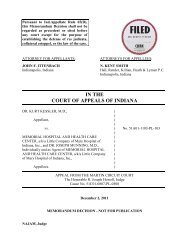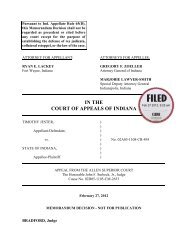David A. Shotts v. State of Indiana
David A. Shotts v. State of Indiana
David A. Shotts v. State of Indiana
You also want an ePaper? Increase the reach of your titles
YUMPU automatically turns print PDFs into web optimized ePapers that Google loves.
arrest in a receiving state—in this case <strong>Indiana</strong>—based on a warrant issued by another state—in<br />
this case Alabama. For the reasons explained below, we conclude that it does.<br />
Even if the Alabama warrant was defective, suppression <strong>of</strong> the discovered gun in the<br />
<strong>Indiana</strong> proceeding ―is not an automatic consequence.‖ Herring, 129 S. Ct. at 698. Suppression<br />
<strong>of</strong> evidence under controlling Fourth Amendment precedent ―turns on the culpability <strong>of</strong> the<br />
police and the potential <strong>of</strong> exclusion to deter wrongful police conduct.‖ Id. Specifically,<br />
invalidity <strong>of</strong> a warrant does not necessarily require exclusion <strong>of</strong> evidence seized under its<br />
authority. Id. at 701. Even if a warrant is invalid for lack <strong>of</strong> probable cause, ―the exclusionary<br />
rule does not apply if the police acted ‗in objectively reasonable reliance‘ on the subsequently<br />
invalidated search warrant.‖ Id. (quoting United <strong>State</strong>s v. Leon, 468 U.S. 897, 922 (1984)).<br />
―[E]vidence should be suppressed ‗only if it can be said that the law enforcement <strong>of</strong>ficer had<br />
knowledge, or may properly be charged with knowledge, that the search was unconstitutional<br />
under the Fourth Amendment.‘‖ Illinois v. Krull, 480 U.S. 340, 348–349 (quoting United <strong>State</strong>s<br />
v. Peltier, 422 U.S. 531, 542 (1975)). Put differently, the high cost associated with suppression<br />
is appropriate only where police acts are ―sufficiently culpable‖ and suppression can<br />
―meaningfully deter‖ those acts. Herring, 129 S. Ct. at 702. The ―good-faith inquiry is confined<br />
to the objectively ascertainable question whether a reasonably well trained <strong>of</strong>ficer would have<br />
known that the search was illegal‖ in light <strong>of</strong> ―all <strong>of</strong> the circumstances.‖ Leon, 468 U.S. at 922<br />
& n.23.<br />
The trial court found that the <strong>Indiana</strong> <strong>of</strong>ficers acted in good-faith reliance on a warrant<br />
they reasonably presumed to be valid. This finding is fully supported in the record and disposes<br />
<strong>of</strong> <strong>Shotts</strong>‘s claim under the Fourth Amendment. We think this conclusion follows inexorably<br />
from the Supreme Court‘s ruling in Herring. There, one <strong>of</strong> the arresting <strong>of</strong>ficers—who knew the<br />
defendant as ―no stranger to law enforcement‖—inquired <strong>of</strong> his county and a neighboring one<br />
whether there were any outstanding warrants for the defendant‘s arrest. Herring, 129 S. Ct. at<br />
698. The warrant clerk in the neighboring county responded that her database included an active<br />
arrest warrant for the defendant. Id. When the clerk tried to retrieve the actual warrant,<br />
however, she learned that the warrant had been recalled and was no longer valid. Id. The clerk<br />
tried to report her error to the arresting <strong>of</strong>ficers, but they had already arrested the defendant and<br />
found contraband in his possession. Id. The Supreme Court held that the Fourth Amendment<br />
6


